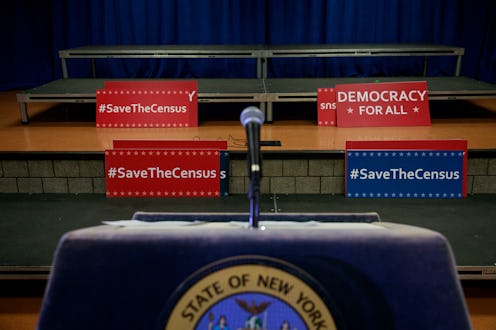News
Why These 17 States Are Fighting HARD To Throw Out That Census Citizenship Question

In a lawsuit filed Tuesday, 17 states, several cities, and the District of Columbia sued the Trump administration over the census citizenship question. The states called the administration's plan to ask residents about their legal status during the next population survey "unconstitutional and arbitrary," and argued that it "will fatally undermine the accuracy of the population count and cause tremendous harms" to states with large immigrant populations. And it's important to note that each state shared one thing in common: they have democratic attorneys general.
“One of the federal government’s most solemn obligations is a fair and accurate count of all people in the country, citizen and non-citizen alike,” New York Attorney General Schneiderman, who is leading the lawsuit, said in a statement, according to his official website. "Now, the Trump administration is breaking with that tradition – recklessly abandoning nearly 70 years of practice by demanding to know the citizenship status of each resident counted."
New York, Connecticut, Delaware, Illinois, Iowa, Maryland, Minnesota, New Jersey, New Mexico, North Carolina, Oregon, Rhode Island, Vermont, Washington, Massachusetts, Pennsylvania, and Virginia are plaintiffs in the lawsuit; so is Washington D.C., the U.S Conference of Mayors and the cities of New York, Chicago, Philadelphia, Seattle, San Francisco, and Providence, Rhode Island.
The Trump administration announced in March that, for the first time in decades, the Census Bureau will ask U.S. residents about their citizenship status on the 2020 census. The move drew immediate criticism, primarily from Democrats, who argued that it will rob immigrant-heavy states of federal funds and diminish their representation in the House of Representatives and Electoral College.
"This is really just an effort to punish places like New York that welcome immigrants, that are accommodating to immigrants and embrace the American tradition of open arms for all," Schneiderman said at a press conference announcing the lawsuit, NBC News reported. "We stand to lose money because this determines congressional representation and the Electoral College. This is an affront to our national ideals and this is an affront to the constitution."
The worry of Schneiderman and others is that undocumented immigrants, aware of President Trump's staunch opposition to legal and illegal immigration, may skip out on filling out the census entirely if it includes a question about their citizenship status for fear of being deported. Although federal law prohibits the Census Bureau from sharing data with other government agencies, that isn't a widely-known fact, and if enough undocumented immigrants skipped the census, it could cause a ripple effect that would harm everybody who lives in immigrant-heavy areas, citizens and non-citizens alike.
Census data is used for a wide variety of purposes, one of them being the distribution of federal funds for infrastructure, research grants, schools, and a whole host of other purposes. Places with higher populations generally receive more federal resources, but undocumented immigrants skipping out on the census would result in a drastic undercount of the population in immigrant-heavy areas. This, in turn, would result in disproportionately fewer federal resources for those places.
The census' population data is also used to allocate congressional seats and electoral votes to the states, which are distributed based on the total number of residents — not citizens — in a given area. But if the citizenship question results in a population undercount, states with large immigrant populations could lose congressional seats and electoral votes. A study by two Texas researchers found that adding a citizenship question would result in eight fewer electoral votes for Arizona, California, Florida, and Texas.
It's worth stressing that all of the states that sued the Trump administration have Democratic Attorneys General, and that's not a coincidence: Census bureau data shows that congressional districts with heavy immigrant populations — that is, the districts that would be most hurt by the administration's plan — are much more likely to elect Democrats than Republicans.